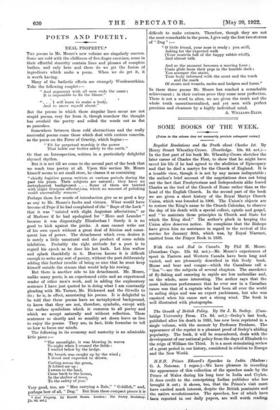POETS AND POKTRI.
REAL PROPERTY.*
THE poems in Mr. Monro's new volume are singularly uneven. Some are cold with the chilliness of five-finger exercises, some in their effortful sincerity contain lines and phrases of complete bathos, and only here and there do we get the fusion of ingredients which make a poem. When we do get it, it is worth having.
Many of the bathetic effects are strangely Wordsworthian. Take the following couplet :— " And argument with all men ends the same : It is impossible to fix the blame."
" . . I will learn to make a body, And to move myself about."
But the poems in which these singular lines occur are not stupid poems, very far from it, though somehow the thought has overlaid the poetry and rolled the words out as flat as pancakes.
Somewhere between these cold abstractions and the really successful poems come those which deal with curious conceits, as the poem on the Force of Gravity, which begins :- " Fit for perpetual worship is the power That holds our bodies safely to the earth."
Or that on Introspection, written in a particularly delightful rhymed rhythm.
But it is not till we come to the second part of the book that we reach true poetry at all. Upon this section Mr. Monro himself seems to set small store, he classes it as containing
" chiefly fugitive poems written at various periods during the past ten years. Their subjects are natural ; they have no metaphysical background. . . . Some of them are tainted with slight Georgian affectations, which no amount of polishing could successfully remove."
Perhaps these few words of introduction give us as good a key as any to Mr. Monro's faults and virtues. What would have become of Pope if he had complained of the " Rape of the Lock " that it was " tainted with slight Augustan affectations," or of Marlowe if he had apologized for " Hero and Leander " because it was disgustingly Elizabethan ? Surely it is no good to kick against the pricks. A man cannot write out of his own epoch without a great deal of friction and conse- quent loss of power. The detachment which even desires it is surely a little unnatural and the product of some subtle inhibition. Probably the right attitude for a poet is to regard his epoch as he does his hot bath. Let him wallow and splash thankfully in it. Heaven knows it is difficult enough to write any sort of poetry, without the poet deliberately adding this further trouble of being so nice that he must keep himself outside the stream that would help his rowing.
But there is another side to his detachment. Mr. Monro, unlike many poets, is an experienced critic and an experienced reader of other men's work, and in adding the explanatory sentence I have just quoted he is doing what I am constantly pleading with Mr. Turner, Mr. Rickward and the Sitwells to do ; he is, in effect, annotating his poems. It is delightful to be told that these poems have no metaphysical background, to know that they are not, therefore, symbolic, except with the surface symbolism which is common to all poetry and which we accept naturally and without reflection. These sentences so shortly and so sensibly set down leave us free to enjoy the poems. They are, in fact, little formulae to tell us how to focus our minds.
The following in its economy and austerity is an admirable little piece :—
" The moonlight, it was blowing in waves To-night when I crossed the fields : I waited below by the hedge.
My breath was caught up by the wind ; • I stood and expected to drown.
Curling across the green, It folded me up I swam to the land, Came back to the house, In the shelter of trees, To the safety of you."
Very good, too, are " Man carrying a Bale," " Goldfish," and, perhaps best of all, " Dog." But from these compact pieces it is
• Real Property. By Harold Monro. London : The Poetry Bookshop. .10.16. 6d. net.] difficult to make extracts. Therefore, though they are not the most remarkable in the poem, I give only the first two stanzas of " Dog " :- " 0 little friend, your nose is ready ; you sniff, Asking for the expected walk
(Your nostrils full of the happy rabbit-whiff), And almost talk.
And so the moment becomes a moving force ; Coats glide from their pegs in the humble dark ; You scamper the stairs, Your body informed with the scent and the track and the mark Of stoats and weasels, moles and badgers and hares."
In these three poems Mr. Monro has reached a remarkable achievement ; in their curious genre they come near perfection. There is not a word to alter, we are given the truth and the whole truth unsentimentalized, and yet seen with perfect precision and clearness by a highly individual mind.
A. WrrazAms-Ersas.


































 Previous page
Previous page